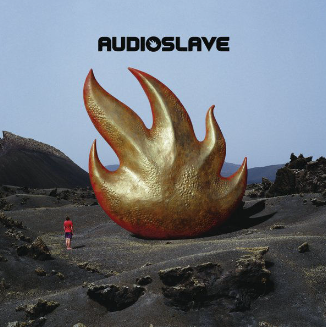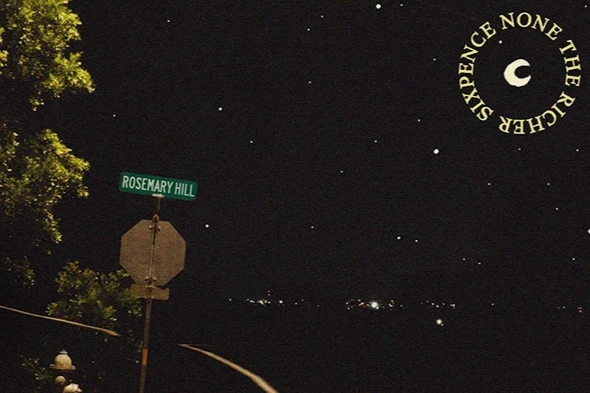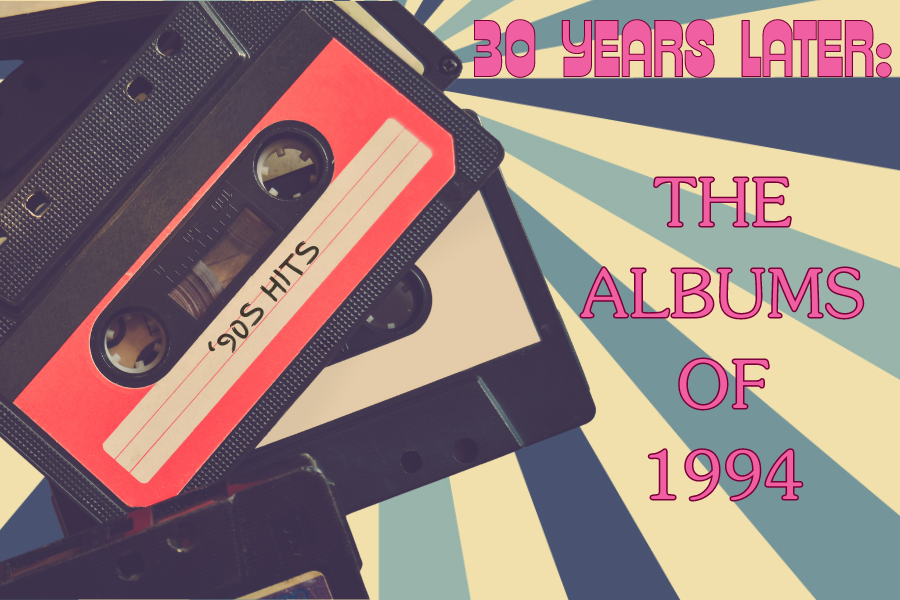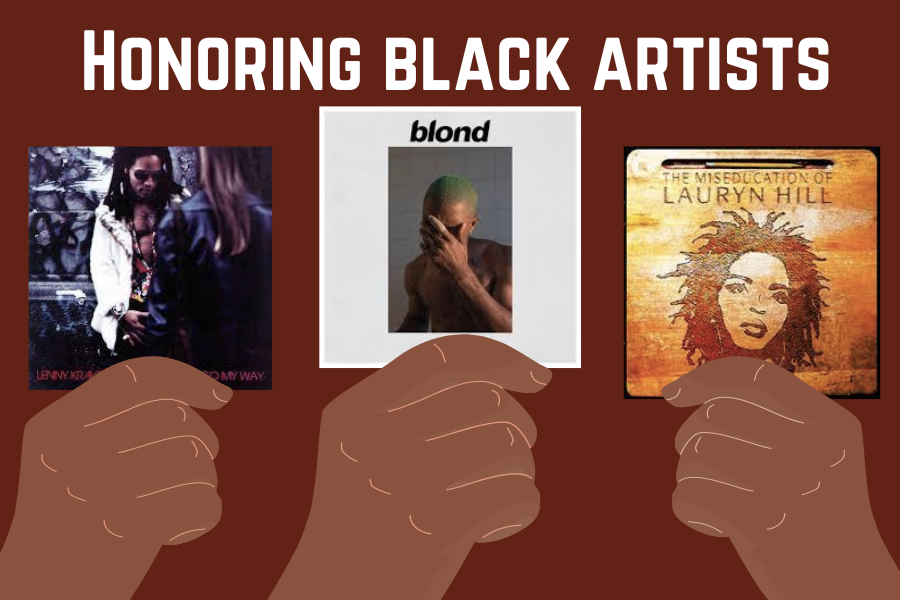It’s not hard to trace the path from Audioslave to the boys, but the two groups are also clearly distinct. Audioslave is the last vestige of the old rock order: smothered in grunge, aggressively male and indistinguishable from ‘90s music despite residing firmly in the next decade. Audioslave’s showstopping self-titled debut album and “the record” — which just took Best Alternative Music Album at the GRAMMY awards — are both legacy-defining albums. To find out which one is the king of supergroup rock, I’ve compared five of their songs alongside each other. However, to establish which supergroup is the best, it must first be established what a supergroup is.
What makes a supergroup
Most descriptions of boygenius mention that they are not a typical supergroup. Ironically, it’s become such a cliche that one can no longer disassociate the words “boygenius” and “supergroup.” However, the axiom underpins the differences between “the boys” — indie legends Julien Baker, Phoebe Bridgers and Lucy Dacus — and more “traditional” harder-rocking projects, which are stereotypically male.
Even the name boygenius is a jab at men who are showered with excessive adulation. The term is reminiscent of the instantaneous takeover of pop culture by Seattle grunge rock, which was overwhelming even for those who started it: Eddie Vedder never wanted the attention; Kurt Cobain was killed by it. Interestingly, the album cover of boygenius’ full-length debut “the record” is oddly reminiscent of “Ten,” Vedder’s debut with Pearl Jam.
Like the boys, Vedder was part of a supergroup; his was Temple of the Dog, where he sang alongside the late, great Chris Cornell of Soundgarden and Audioslave fame. Wait, play that back a bit. Audioslave. The preeminent supergroup of the aughts featured Cornell alongside activist rockers Rage Against the Machine.

The boys even requested Audioslave’s song “Doesn’t Remind Me” for an NPR episode, discussing the song’s catharsis. The fondness for throwing their voices and breaking guitars — as well as relying on guitar to play a prominent role on their albums — isn’t the only similarity between the bands: the collective hatred of capitalism is hard to miss, both groups are built around absolutely transcendent talents in Cornell and Baker, and the guitar is very, very good.
Made for Radio
“Like A Stone” by Audioslave vs. “Cool About It” by boygenius
This first comparison is strength on strength: the boys rightly nabbed a GRAMMY award nomination for can’t-miss hit “Cool About It,” while Audioslave was nominated for “Like a Stone” back in early 2004. The latter song hits hard as Brad Wilk comes out slamming on the drums while Cornell slowly builds the tension. You get to appreciate the layers of Cornell’s unparalleled voice until the song explodes in a mind-melting Tom Morello guitar solo. The solo is reminiscent of yet distinct from the chorus of the song, recalling the way legendary guitarist Edge Evans segued from piano to guitar on U2 hit “New Year’s Day.” “Like a Stone” finishes off with Cornell’s haunting voice, longing for someone who has abandoned him.
“Cool About It” similarly deals with distance — in this case, emotional distance — from someone else. It opens with soft guitar, which is just as pleasing as the banging drums in “Like A Stone,” and one of the few voices in this world to rival Cornell’s. Baker’s voice sounds like honey as she rolls off a first verse about small talk at a bar. This is bliss. Baker, Dacus and Bridgers each handle a verse, all of which share a similar structure. Well, the structure is the same until Bridgers subverts it to great effect by adding an extra line at the end.
Verdict: Morello and Cornell both turned in premier performances here, enough to surpass even the famous synergy of the boys. “Like a Stone” wins by the width of a guitar pick.
Catharsis
“Cochise” by Audioslave vs. “$20” by boygenius
An ominous grunge-y hum begins the intro to “Cochise.” It’s distressing and distressed.
“$20” begins like so many songs on these two albums, on the foundation of a voice — Baker’s. She handles the lyrics that aren’t layered harmonies, while a base layer of guitar slowly winds up to the song’s showstopping climax.
The drum line of “Cochise” slowly intensifies, building the suspense.
The boys prove their harmonizing skills are up there with the greats; the legendary layers from Crosby, Stills and Nash at the end of “Suite: Judy Blue Eyes” aren’t too lofty of a comp. The result is the culmination of “$20” with one killer verse, where their voices layer over each other to create a feeling of desperation in a song written from the point of view of someone desperate for, well, $20.
Morello drops a melodic riff, an introduction announcing the leading man. Cornell enters “Cochise” with a scream, launching into a song evoking author Charles Williams’ belief in substituted love —with all of Williams’ occult tendencies fully represented, I might add. It’s odd. There’s a lot of “grunge” going on behind Cornell until it clears up into some light drums and Tim Commerford’s bass guitar for a chilling verse that segues into the song’s final chorus.
Verdict: “Cochise” rocks, but gets rolled by the stunning harmonies of “$20.”
The ballads
“I Am the Highway” by Audioslave vs. “Emily I’m Sorry” by boygenius
I owe Phoebe Bridgers an apology because, my goodness, I was not familiar with her game. Bridgers takes the lead role in this ballad, singing a simple apology to a girlfriend for being a flawed human. It’s a universal emotion delivered with perfect simplicity, and to listen to the chorus is to experience Lewisian beauty.
“I Am the Highway” gives the polar opposite message from its counterpart. It’s an unapologetic song about having the ability to fend for oneself and not needing to rely on anyone else. Like “Emily I’m Sorry,” however, “Highway” is a slower, simpler song built off of a guitar strum. Morello shows a mellower side with a toned-down performance that compliments Cornell’s voice beautifully and enriches the song.
Verdict: If “Cochise” vs. “$20” was Cornell vs. Baker, this showdown is more Bridgers vs. Morello. Here, boygenius prove that they can win in either matchup.
Known
“Show Me How to Live” by Audioslave vs. “True Blue” by boygenius
“True Blue” is a Dacus special about feeling connected to someone who knows you better than yourself. It’s a great guitar performance from the boys — it sounds to me like Baker’s playing — setting up Dacus for a soothing, unhurried performance that doesn’t need to go anywhere fast to leave listeners enthralled. The lyrics are almost rambling, in a natural sort of way. The song doesn’t do anything special, but it’s an excellent changeup; its placing before the faster-paced “Cool About It” on the tracklist feels intentional.
If “True Blue” is a changeup, “Show Me How to Live” is high heat for a sword. Like the former song, Audioslave’s rocker expresses a desire to know more about oneself, though it is expressed as a plea for mercy rather than a desire for company. From the beginning — Audioslave, as you may have noticed, has the best intros — Morello welcomes listeners with an inviting guitar strum, a precursor to yet another exceptional performance set to yet another heavy drum line by Wilk. This track distinguishes itself by… well, by having Cornell absolutely scream his head off — to great effect, I might add. It’s very, very hard to compete with that.
Verdict: Dacus and the boys put up a great fight here, but Cornell brings his out pitch and has them for a swinging strikeout.
Insanity
“Shadow on the Sun” by Audioslave vs. “Not Strong Enough” by boygenius
A strumming guitar sets a tense scene, ready to explode. Something in Cornell’s voice evokes the same tension as he laments the loss of a shared consciousness. Predictably, the catharsis is reached in the chorus. Cornell unleashes his powerful range with a strong guitar volley behind him, fueled by excellent performances by Commerford and Morello. The Morello solo is as fantastic as you would expect it to be.
Like the two previous matchups, the boys’ offering has a similar theme as “Shadow on the Sun,” but a different take on it. The latter features Cornell singing about “how people go insane;” the former is about the narrator being insane. “I don’t know why I am the way I am,” sing Baker and Bridgers. Both have signature performances showcasing stunning vocal ranges and insightful lyricism — oh, and the harmonies are otherworldly. The Best Rock Song of 2023 deserved all of the accolades it got and more.
Verdict: “Shadow on the Sun” is an awesome song, but there’s a difference between being awesome and being the best rock song in any particular year. The gap between “Not Strong Enough” and “Shadow” is an example of that difference.
Supremacy
Audioslave brought a standard rock formula with an ubertalented lineup, a combination which naturally resulted in one of the best albums of the aughts. They weren’t different from other supergroups in many ways, they were just better. However, as much of a cliché as it’s become, boygenius really have redefined what a supergroup can be. Where most supergroups show less cohesion than “natural” counterparts, the synergy of the boys is unmatched. At the end of the day, that’s why Audioslave just can’t keep up with “the record” — not because Morello, Wilk, Commerford and Cornell didn’t show up, but because they only mesh unusually well, not preternaturally well. They didn’t have a chance against the world’s most musical book club.
The Pathfinder rates “Audioslave” an 8/10 and “the record” a 9/10.





![Pantone’s selection of the 2025 Color of the Year is revealed: Mocha Mousse. Ceramics teacher Ashley Drissell enjoys this year’s selection. “Maybe it’s the name but [Mocha Mousse] reminds me of chocolate and coffee. It makes me hungry. It’s very rich and decadent,” Drissell said.](https://pwestpathfinder.com/wp-content/uploads/2025/02/DSC_0015-1200x800.jpg)









![Rested against a rainbow of colored pencils, a phone plays singer-songwriter Gracie Abrams’ single “Risk.” Abrams released the song as the lead single to her upcoming album “The Secret of Us.” “We had real, true fun writing this album. There were also the occasional tears. Audrey [Hobert] and I wrote ‘Risk’ on our couch at home,” Abrams wrote on Instagram.](https://pwestpathfinder.com/wp-content/uploads/2024/05/DSC_0009-2-1200x800.jpg)





![2023 was defined by female vocalists such as Miley Cyrus, Taylor Swift and Paramore’s Hayley Williams as their diversity and talent amongst their respective genres topped the musical charts. Williams took to Instagram to show her gratitude for having owned the No. 1 spot on Billboard’s Top 100 chart. “We know enough by now to know success doesn’t equal value. That being said, to experience the [No. 1] on this album, as this version of Paramore, is such a sweet and surreal moment to celebrate together,” Williams wrote.](https://pwestpathfinder.com/wp-content/uploads/2023/12/2023-A-Musical-Recap-2.0-1.png)


mikalah owens • Feb 29, 2024 at 10:26 am
Will!! This is such a good article! (This made me want to 1v1 you when it comes to music journalism because of how smart the idea to write this was). You did both bands justice:) i <3 chris cornell
Will Gonsior • Mar 2, 2024 at 5:22 pm
Thank you, Mikalah! This means so much coming from you!
Serena Liu • Feb 21, 2024 at 1:34 pm
This is so good Will! The more familiar I become with your game, the more impressed I am!